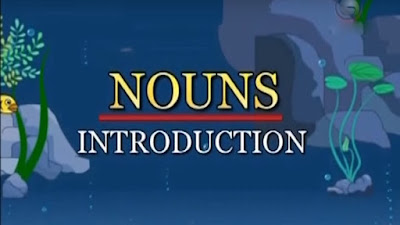Learn All About Nouns and Types of Nouns with Examples
What is a Noun?
A noun is an important part of speech. It is a word that names a person, place or thing. The word 'thing' here refers to anything that we can think of. It can be an animal, an event, an object or an idea. A noun is a "naming" word.For example in the sentence:
London is a beautiful city.
The words London and city are nouns.
London is a beautiful city.
The words London and city are nouns.
Any English sentence has three parts. The subject, object, and predicate. The function of the noun is related to these three parts of the sentence. Nouns have several important functions in a sentence. Nouns are subjects, direct objects, indirect objects, objects of the preposition, and predicate nominatives.
Types of Nouns
Nouns can be classified into following types. Follow the links below to get to the detailed lessons you need.
Common nouns
Common nouns are words for people, animals, places or things.Examples: teacher, actor, parrot, market, watch, bread, train, etc.
Proper nouns
Proper nouns are names for particular people, places, or things.They always begin with a capital letter.Examples: Harry Potter, America, New Delhi, June, Mount Everest, Independence Day, etc.
Abstract nouns
An abstract noun denotes an abstract quality, state, or action, rather than a concrete quality. These nouns have no physical shape. They can't be experienced with our five senses.Examples: love, kindness, intention, loyalty, dream, knowledge, etc.
Concrete nouns
Nouns that can be experienced with our five senses are called concrete nouns. They have physical shapes and can be touched, seen, tasted, and felt.Examples: table, book, eggs, cat, mango, cup, elephant, mountain, can, fan, etc.
Collective nouns
Collective nouns are words for groups of people, animals, or things, taken together, and spoken of as one whole.
Examples: library, herd, crowd, school, galaxy, etc.
Material nouns
Material nouns are the names of materials or substances out of which things are made.
Examples: gold, iron, milk, tea, salt, diamond, plastic, brass, etc.
Singular nouns
A singular noun name one person, place, thing, or idea.
Examples: a ship, a photograph, an owl, an orange, etc.
Plural Nouns
Plural noun names more than one person, place, thing, or idea.
Examples: stars, birds, photos, foxes, butterflies, etc.
Countable Nouns
Nouns that have plural forms are called countable nouns. They can be counted. That is why; they are called countable nouns.Examples: book, apple, chair, car, kite, sister, girl, boy, etc.
Uncountable Nouns
Nouns that cannot be counted are called uncountable nouns. Uncountable nouns have no plural forms.
Examples: milk, oil, sugar, gold, honest, anger, art, air, coffee, coal, corruption, cotton, energy, rice, sand, rain, etc.
Gender Nouns
There are four types of gender nouns in English.- Masculine gender nouns
Examples: bride, prince, actor, brother, nephew, uncle, etc.
- Feminine gender nouns
Examples: bridegroom, princess, actress, sister, niece, aunt, etc.
- Common-gender nouns
Examples: doctors, teachers, dancers, pupils, lawyers, etc.
- Neuter gender nouns
Examples: bench, mirror, ball, leaves, wind, sun, etc.
Compound Nouns
A compound noun is a noun that is made up of two or more words.
Examples: washing machine, toothbrush, sunglasses, football, housefly, walking-stick, mother-in-law, etc.
Gerunds
A gerund is a verb that acts as a noun. It is formed by adding 'ing' to the verb.
Examples: walking, sleeping, writing, studying, playing, jogging, etc.
Animate nouns
An animate noun is a semantic category of noun, referring to a person, animal, or other creature.
Examples: elephant, baby, sheep, boy, etc.
Inanimate nouns
An inanimate noun is a semantic category of noun, referring to a place, thing, or concept.
Examples: road, bicycle, mountain, relaxation, rain, etc.
Denominal nouns
A denominal noun is a noun that is formed from another noun, usually adding a suffix. Many denominal nouns are context sensitive.
Examples: librarian(from library), villager(from village), booklet(from book), etc.
Attributive nouns
Attributive nouns are nouns that modify another noun. It functions as an adjective. It is also known as a noun adjunct.
Examples: chicken soup, birthday party, macaroni salad, etc.
Verbal nouns
Verbal nouns are nouns formed from verbs. This might be a gerund, infinitive, or other noun derived from a verb.
Example: I love swimming. ( here swimming is verbal noun)
Appositive
An appositive is a noun or noun phrase that defines or clarifies another noun right beside it.
Example: My friend, a teacher is moving to Dubai.( friend and teacher are the same person. teacher is an apposition to friend.)
Case nouns
A case noun is the category of a noun expressing relations between the thing denoted by the noun and the other things, properties, or actions. Case nouns have further subclasses, subjective(nominative), objective, and possessive. 

ConversionConversion EmoticonEmoticon